ELSEE
CNGFThe Environmental Laboratory for Sustainability and Ecological Education
Redefining Educational Spaces
ELSEE has two key components:
1. an educational garden and living laboratory
2. a set of curricula to reconnect youth with nature
The ELSEE model began at California Native Garden Foundation and has served as a community resource and destination for school field trips, classes, and ecological summer camps for over 15 years. As our flagship garden at 76 Race Street, ELSEE is the only SITES-certified destination in San Jose, meeting just under 200 ecological benchmarks. These criteria feature key educational elements, including seven local California plant communities, play structures made of reused materials, an aquaponics system, a chicken coop, and much more.
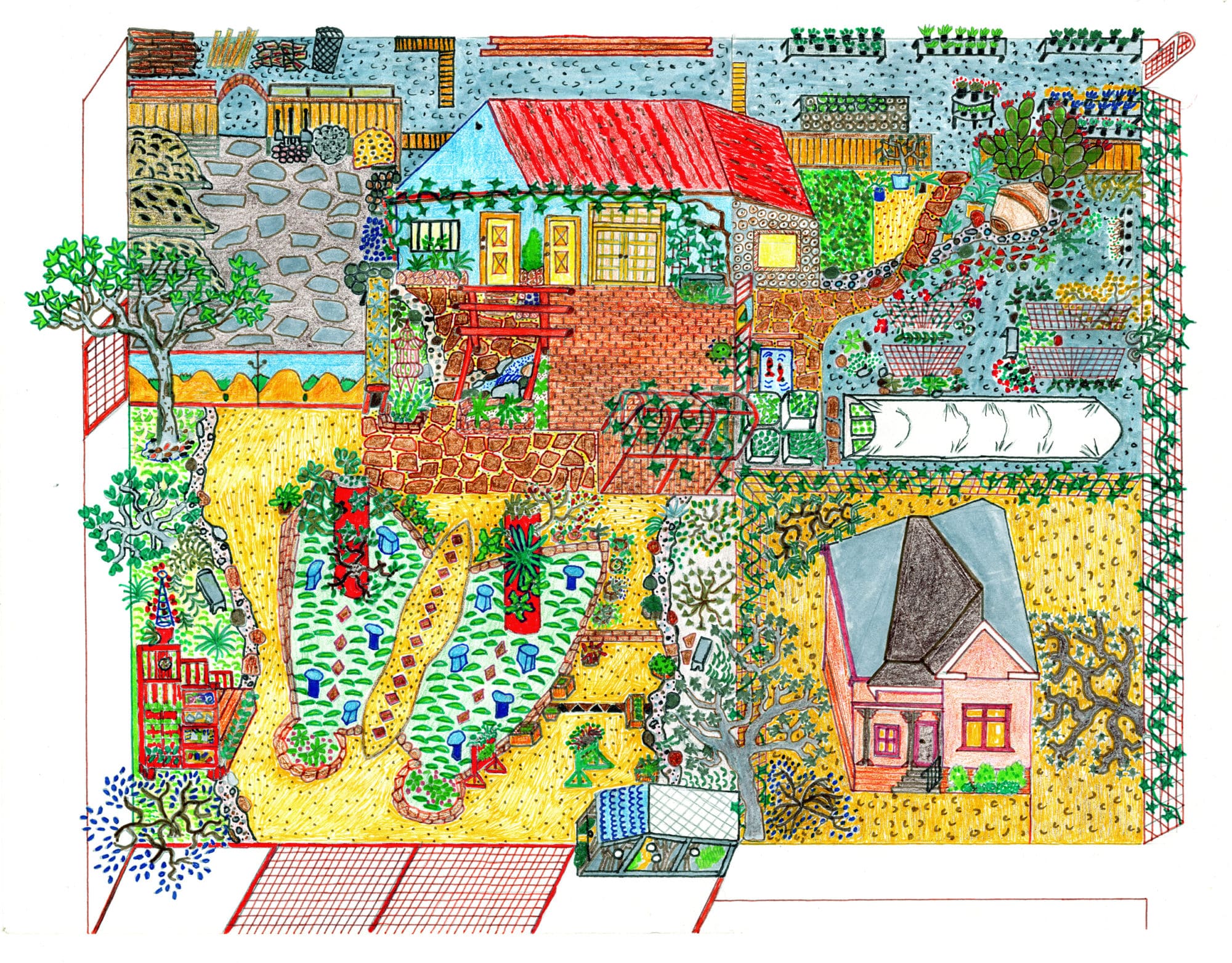
Drawing by Alrie Middlebrook
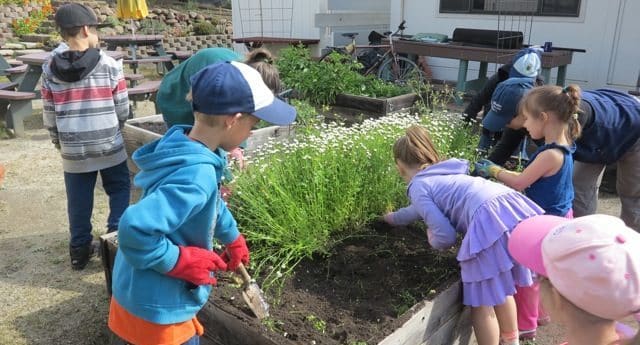
Tools for Outdoor Education
ELSEE has an evolving set of curricula and programs. Our classes are developed and implemented with skilled professionals and community members, including beekeepers, entomologists, ecologists, artists, indigenous storytellers, greywater specialists, and college interns from a broad array of majors – from engineering to education to landscape design.
TeachIN Nature
In partnership with San Jose Evergreen Community College District – Workforce Institute, we are developing certification programs for K-8th grade teachers. Educators will learn to:
• design and build ELSEE gardens at their schools
• garner support from administrators and the community
• implement ELSEE curriculum, badge programs, and events
• redesign their STEAM curriculum for an outdoor classroom
Through these programs, teachers will become leaders in ecological education.
Playing with Intent
For early childhood educators, we have a certification program featuring our Nature Immersion curriculum for ages 0-5. Each lesson begins with a relationship between a California native plant and animal and involves a variety of activities to teach and reinforce this lesson, including indigenous storytelling, music and movement, an art or science project, gardening, cooking, and a shared snack or gratitude.
Earth Heroes Nature Badge Program
A program for youth ages 6-14 to learn and develop skills in protecting ecosystem services. Students complete lessons and activities, earning up to 30 badges. This program has been implemented at CNGF’s summer Nature Camp as well as at Garden for Ghana schools.
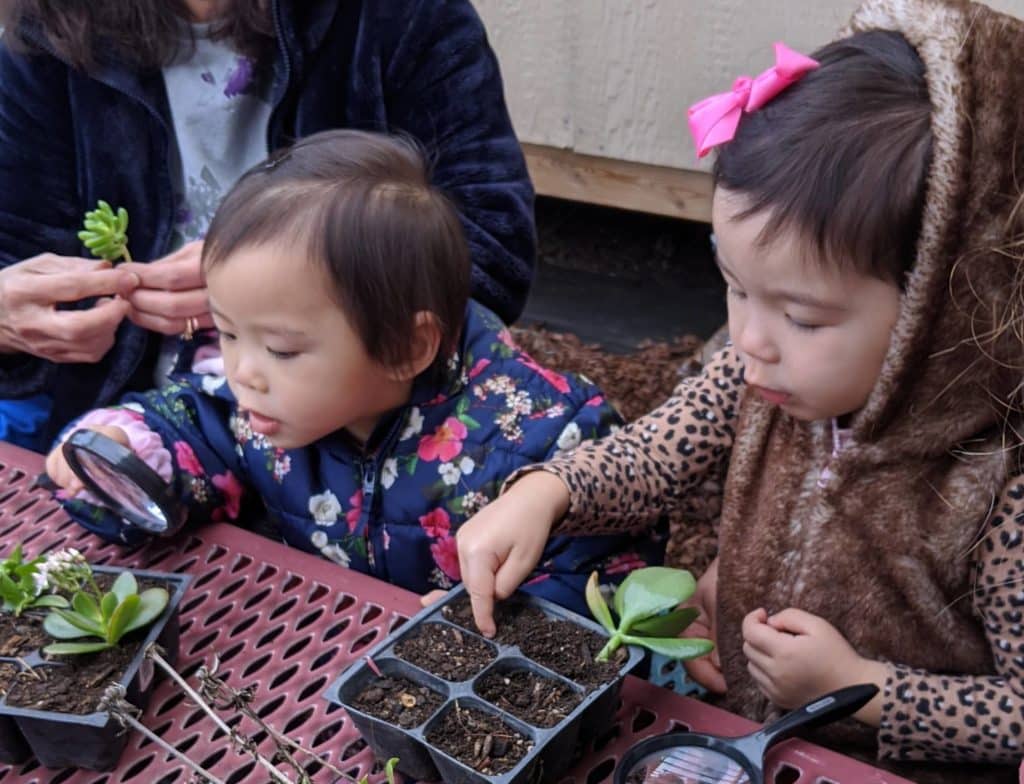 Young children are natural scientists who have evolved to explore the world around them. By learning the specific plants and animals of our ecosystem, urban children develop a lifelong love and stewardship of nature. Our team of designers, naturalists, and educators have created our “Playing with Intent” lesson plans to closely complement our ELSEE (Environmental Laboratory for Sustainability and Ecological Education) teaching gardens. Our nature-immersion curriculum, taught in and with our carefully designed garden, combines indigenous story-telling and play-acting, movement and music, art, cooking, science, and garden activities to provide a rich variety of sensory experiences for urban children and their families. Our mission with our gardens and curriculum is to teach children, their families, and their teachers how to grow food, restore our local ecology using native plants, and above all, become stewards of our changing planet. We anchor our curriculum with Native stories, as these represent the culture and ecology that evolved together here in California. By understanding the species indigenous to our region, we can work to restore our local ecosystem, and thrive within it.
Young children are natural scientists who have evolved to explore the world around them. By learning the specific plants and animals of our ecosystem, urban children develop a lifelong love and stewardship of nature. Our team of designers, naturalists, and educators have created our “Playing with Intent” lesson plans to closely complement our ELSEE (Environmental Laboratory for Sustainability and Ecological Education) teaching gardens. Our nature-immersion curriculum, taught in and with our carefully designed garden, combines indigenous story-telling and play-acting, movement and music, art, cooking, science, and garden activities to provide a rich variety of sensory experiences for urban children and their families. Our mission with our gardens and curriculum is to teach children, their families, and their teachers how to grow food, restore our local ecology using native plants, and above all, become stewards of our changing planet. We anchor our curriculum with Native stories, as these represent the culture and ecology that evolved together here in California. By understanding the species indigenous to our region, we can work to restore our local ecosystem, and thrive within it.
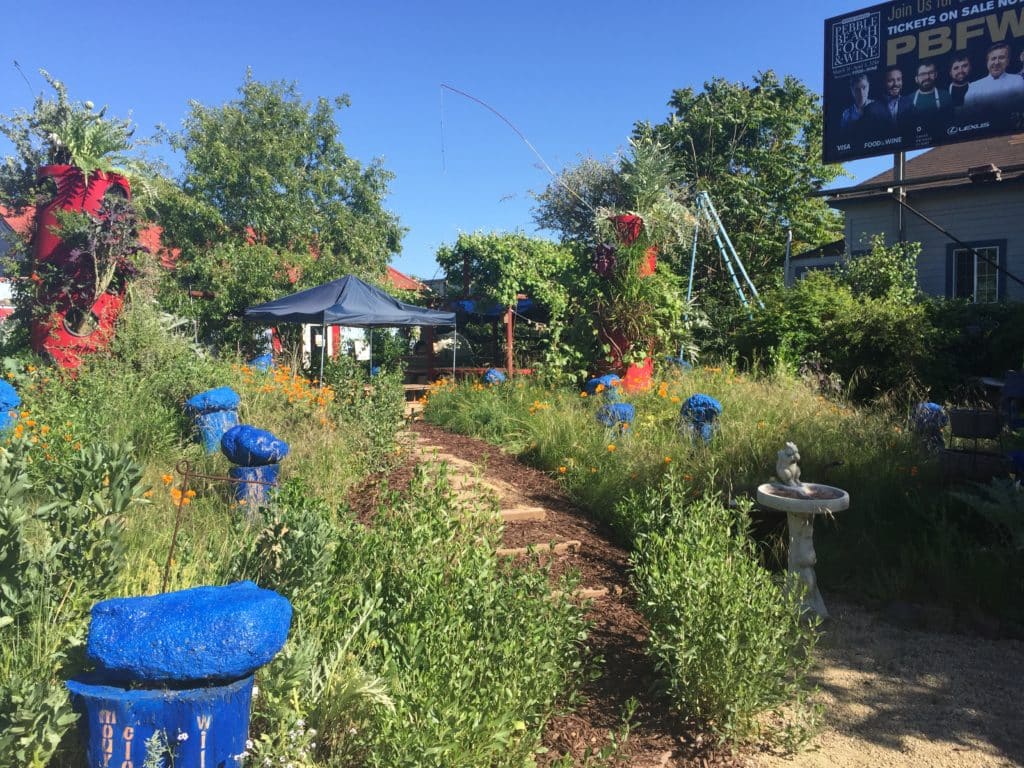 In addition to our “Playing with Intent” preschool lessons, CNGF has developed sets of curriculum for students from elementary school through high school and beyond. Our proposal to expand our ELSEE model throughout the Santee campus would allow elementary students to engage directly in the natural world as they meet the science standards and CORE curriculum. Children — together with their teachers and families — will learn to plant seeds, harvest and prepare nutritious foods, and understand how to compost; through hands-on learning, they will discover how our planet renews itself through the water, carbon, and nitrogen, phosphorous, and potassium cycles, and learn about other crucial ecosystem services – such as pollination, biodiversity, and climate regulation. Our
In addition to our “Playing with Intent” preschool lessons, CNGF has developed sets of curriculum for students from elementary school through high school and beyond. Our proposal to expand our ELSEE model throughout the Santee campus would allow elementary students to engage directly in the natural world as they meet the science standards and CORE curriculum. Children — together with their teachers and families — will learn to plant seeds, harvest and prepare nutritious foods, and understand how to compost; through hands-on learning, they will discover how our planet renews itself through the water, carbon, and nitrogen, phosphorous, and potassium cycles, and learn about other crucial ecosystem services – such as pollination, biodiversity, and climate regulation. Our
Santee gardens will represent the grassland, wetland, chapparal, and riparian ecosystems of California, along with the broad array of flowers, grasses, shrubs, edible plants, and trees found here. Once plants are established, native birds, beneficial insects, and pollinators will follow. Just as importantly, the invisible ecosystem of the soil itself will be restored. Scientists are only beginning to understand the ways in which the microbiome of healthy soil supports the immunity and psychological resilience of children even through their adolescence.
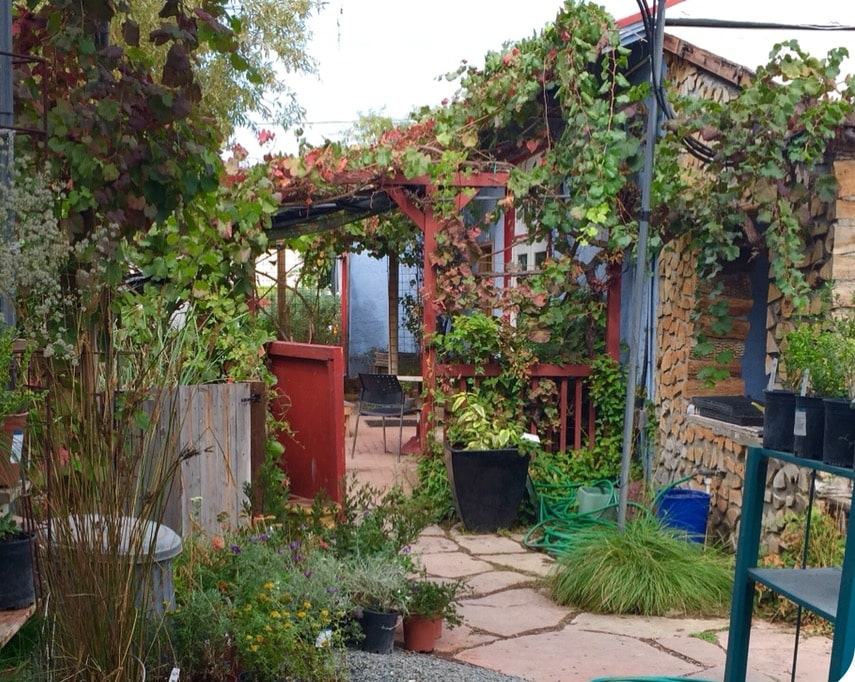 Our teams have been maintaining native and ecological gardens for over 20 years. We know how to build and manage gardens using a sustainable model that will be easy and cost-effective for long-term use. Our native gardens minimize use of fossil fuels by avoiding power tools, lawnmowers, phosphate fertilizers and chemical pesticides.
Our teams have been maintaining native and ecological gardens for over 20 years. We know how to build and manage gardens using a sustainable model that will be easy and cost-effective for long-term use. Our native gardens minimize use of fossil fuels by avoiding power tools, lawnmowers, phosphate fertilizers and chemical pesticides.
Our ideal would be to bring all urban children into the forests and fields each day, but the next best option is to bring nature to the children. In doing so, we can help to build a sustainable, regenerative urban model for our community. We would like to help Santee campus, Educare and the Franklin McKinley School District become a model for what a 21st century, urban school can be.

